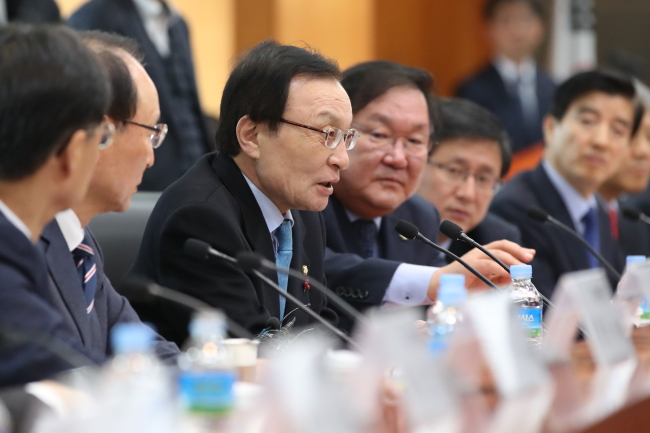Amid South Korea’s efforts to revitalize the economy, debate over whether to lift the securities transaction tax has been rekindled, with the government, lawmakers, and the financial sector divided over the consequences.
The issue regained attention after ruling Democratic Party Chairman Lee Hae-chan said, “It is time we take it up as an agenda item,” in response to a request to either lift or cut the tax in a rare meeting with financial firm representatives on Jan. 15.
“There are various factors in boosting the economy, but revitalizing financial investment is the most important,” Lee added during the meeting at the Korea Financial Investment Association headquarters in Seoul.
 |
cap: Lee Hae-chan, chairman of the ruling Democratic Party, speaks during a meeting with financial firm representatives at the Korea Financial Investment Association headquarters in Yeouido, Seoul, Jan. 15. (Yonhap) |
On top of levying a fixed rate of 0.3 percent on all stock transactions, the government collects what investors deem a “double tax,” in which major shareholders have to submit separate taxes for any change in trade turnover value after divestment. The rules apply regardless of profit or loss on the investments.
Despite Lee’s support for an overhaul, the Ministry of Economy and Finance indirectly expressed its long-standing reluctance to lift the tax through a document released by a lawmaker on Saturday.
“Securities transaction tax is imposed on the stock market in place of the stock transfer income tax,” the ministry said in the document sent to Rep. Kim Jong-hoon of the minor Minjung Party.
“With the size of those actually subjected to the stock transfer income tax being minuscule, it is difficult to (consider) revising the securities transaction tax,” it added.
At the moment, the transfer income tax is levied on those deemed as “large shareholders,” or those who hold shares of a company worth over 1.5 billion won ($1.33 million), but the bar is expected to be lowered to 1 billion won next year and 300 million won in 2021.
The ministry also highlighted its concerns that eliminating the transaction tax would only increase the frequency of short-term trading, instead of the desired effect of buoying the stock market. It cited its decision to cut the tax rate three consecutive times in the early 1990s, which merely buoyed the volume of stock trade and the index for less than six months before returning to precut levels.
But the financial sector continues to claim that the tax relief would revitalize the nation’s sluggish stock market, currently extending a bearish trend from last year.
“Cutting the transaction tax lifts investor sentiment, boosts turnover ratio, and helps increase the average volume of transactions made on a daily basis,” said Won Jae-woong, an analyst at NH Investment and Securities.
“Though it depends on the situation of the market, if the conditions are fixed, then improvement in investor sentiment on the tax cut certainly exists.”
Still, cutting or lifting the tax is expected to deal a major blow to state tax earnings, with the revenue collected from taxes on securities trade surpassing 6 trillion won ($5.3 billion) in 2018. It has surpassed the 6 trillion won-level for three consecutive years.
Korea outranks most developed economies in terms of the tax rate, with the US, Germany and Japan levying no stock trade tax. Others such as Singapore, Hong Kong, and China impose a rate less than 0.2 percent.
(
mkjung@heraldcorp.com)








